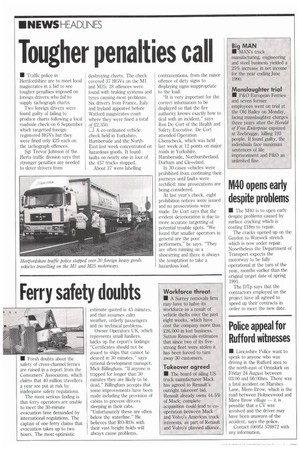Tougher penalties call
Page 8

If you've noticed an error in this article please click here to report it so we can fix it.
• Traffic police in Hertfordshire are to meet local magistrates in a bid to see tougher penalties imposed on foreign drivers who fail to supply tachograph charts.
Two foreign drivers were found guilty of failing to produce charts following a local roadside check on 6 September which targetted foreign registered HGVs but they were fined only £25 each on the tachograph offences.
Sgt Trevor Johnson of the Herts traffic division says that stronger penalties are needed to deter drivers from destroying charts. The check covered 37 HGVs on the M1 and M25; 28 offences were found with braking systems and tyres causing most problems. Six drivers from France, Italy and Ireland appeared before Watford magistrates court where they were fined a total of 22,350.
El A co-ordinated vehicle check held in Yorkshire, Humberside and the NorthEast last week concentrated on hazardous goods. It found faults on nearly one in four of the 457 trucks stopped.
About 37 were labelling contraventions, from the minor offence of dirty signs to displaying signs inappropriate to the load.
"It is very important for the correct information to be displayed so that the fire authority knows exactly how to deal with an incident," says Ron De Cort of the Health and Safety Executive. De Cort attended Operation Chemcheck, which was held last week at 12 points on major roads in Yorkshire, Humberside, Northumberland, Durham and Cleveland.
In 30 cases vehicles were prohibited from continuing their journeys until faults were rectified; nine prosecutions are being considered.
At last year's check, eight prohibition notices were issued and no prosecutions were made. De Cort says that the evident deterioration is due to more accurate targetting of potential trouble spots. "We found that smaller operators in general are the poor performers," he says. "They are often running on a shoestring and there is always the temptation to take a hazardous load.




































































































